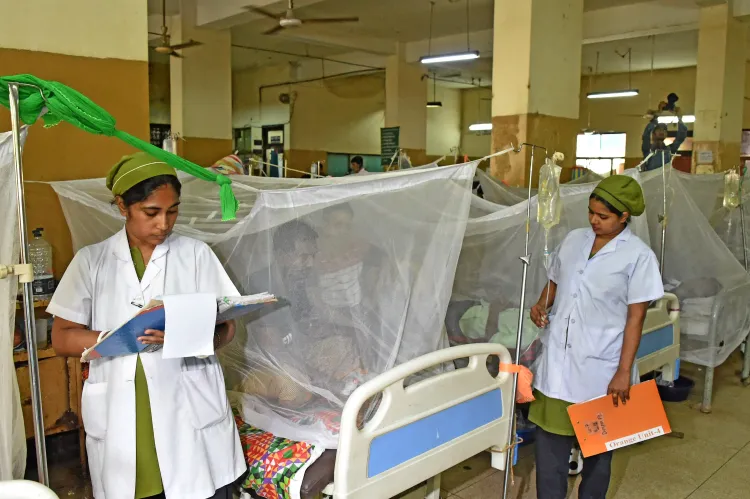Bangladesh: How Many More Lives Will Dengue Claim?

Synopsis
Key Takeaways
- Five new dengue-related deaths reported in Bangladesh.
- Total fatalities in 2025 rise to 230.
- Current hospitalizations exceed 2,500 patients.
- Importance of early diagnosis and preventive measures emphasized.
- Public awareness is crucial in combating the outbreak.
Dhaka, Oct 12 (NationPress) In the past 24 hours, five additional individuals have succumbed to dengue fever in Bangladesh, bringing the total fatalities for 2025 to 230, as reported by various media outlets citing official sources.
During the same timeframe, 953 patients diagnosed with viral fever were hospitalized across the nation, leading to an alarming total of 54,559 dengue cases reported this year, according to the United News of Bangladesh.
Fatalities included two in Dhaka South City Corporation (DSCC), and one each from Dhaka North City Corporation (DNCC), Barishal, and Rajshahi Division (outside city corporations), as indicated by the Directorate General of Health Services (DGHS).
Currently, 889 patients are receiving treatment in Dhaka, while a total of 2,546 patients are hospitalized nationwide.
The report reveals that 61.1 percent of the patients are men and 38.9 percent are women. Among the fatalities, 53.5 percent were men and 46.5 percent were women.
In 2024, 575 people lost their lives to dengue. During that year, 101,214 cases were reported, with 100,040 recoveries, according to DGHS statistics.
On October 9, DGHS Director General Abu Jafor stated that although the number of dengue cases in 2025 has increased compared to last year, the death rate has decreased.
At a press briefing regarding the ‘Typhoid Vaccination Campaign-2025’ at the Health Ministry, Jafor mentioned, "This year, while we see a higher incidence of dengue, the death rate relative to infections is lower," as reported by the United News of Bangladesh.
He emphasized the importance of controlling mosquito breeding and eliminating their larvae to prevent dengue.
"People must utilize mosquito nets and take protective measures. These responsibilities largely fall to individuals. Failure to do so will hinder our efforts to eradicate dengue," he stated.
Jafor also noted, "Our data indicates that over 50 percent of dengue-related deaths in hospitals occur on the first day of admission, indicating that prompt care is crucial. We are committed to providing adequate hospital management."
He highlighted the importance of early diagnosis, asserting that if dengue is identified early, it can often be treated at home with the right medical attention. He attributed the rising death rate to lack of awareness, negligence, and delayed medical care.
Dengue is a viral disease caused by the dengue virus (DENV), transmitted to humans through the bites of infected mosquitoes.
Dengue is prevalent in tropical and subtropical regions worldwide, particularly in urban and semi-urban areas, as per the World Health Organization (WHO).
While there is no specific treatment for dengue, early detection and access to appropriate medical care can significantly reduce mortality rates associated with severe cases.









